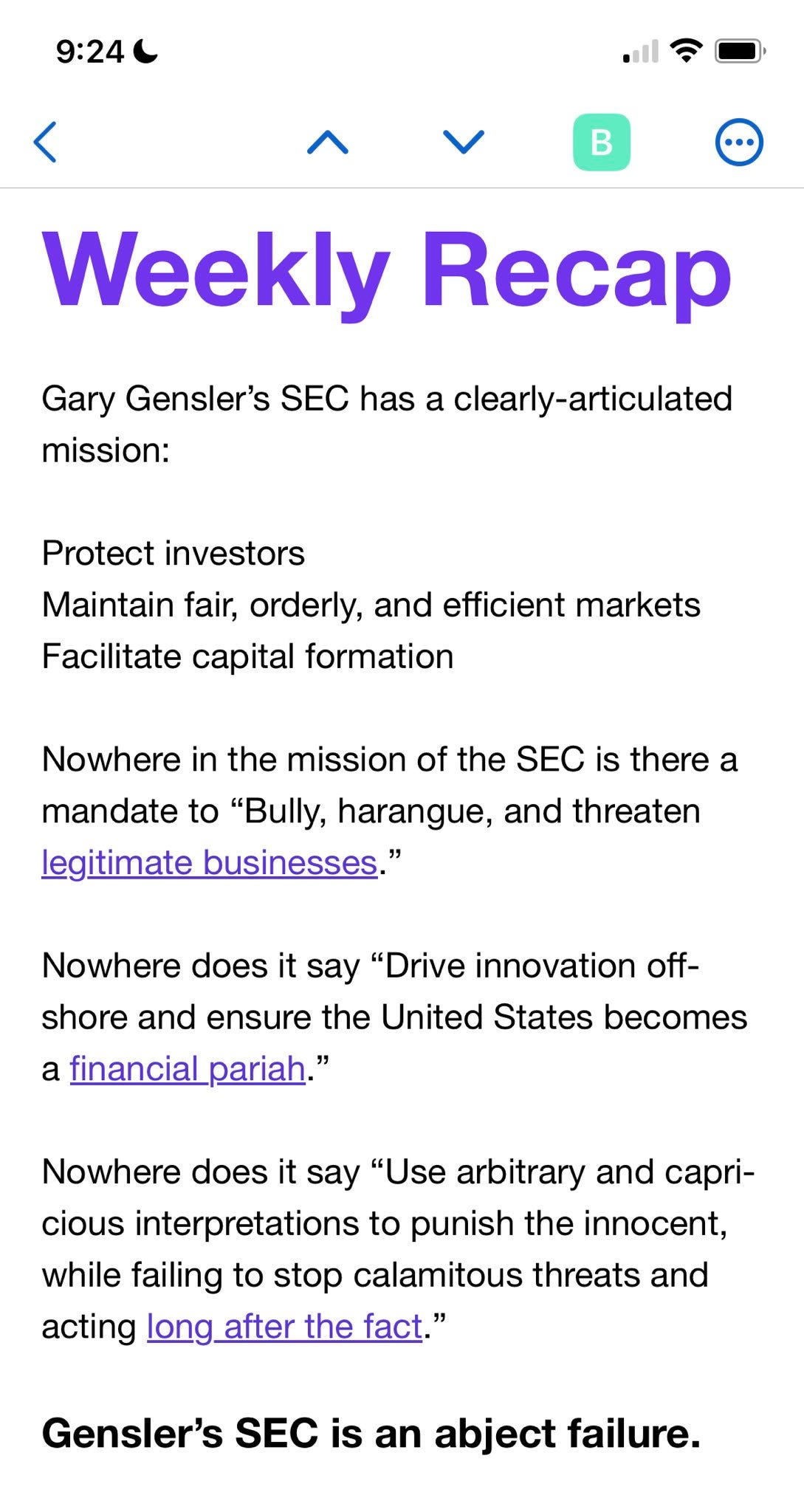
Over the years, the word “insanity” has been defined in many ways.
Miriam-Webster defines it as “a severely disordered state of mind usually occurring as a specific disorder”.
Albert Einstein thought of insanity as “doing the same thing over and over and expecting different results”.
In this edition of the newsletter, I’d like to throw my hat into the ring and add my own definition of insanity, but, first, allow me to start with some context.
In the previous edition of the newsletter, I discussed what I termed “The Great Contraction,” which has been spurred by The Fed’s efforts to put people out of work as a means to rein in inflation.
As you may have intuited from reading that edition of the newsletter, I find the notion of unelected bureaucrats actively seeking to put everyday people out of jobs in efforts to try to remedy the negative results of their own poor policy decisions quite disturbing.
And I became all the more disturbed this week when I read an article in Fortune in which the author explained how nearly 37% of poll respondents indicated that they were holding down more than one full-time job.
Here’s a link to said article: “Overemployment is here: Nearly half of workers have more than one full-time job” (Fortune)
As the article is blocked by a paywall, and I’m sure most of you don’t have a subscription to Fortune (I only got one to read this article), allow me to share some key segments from the article below.
“We all can get away with more when working remotely. On a given day, that may look like making a Trader Joe’s run, dropping off dry cleaning, or, for almost two in five Americans, working an entire second job.
Thirty-seven percent of respondents to a January 2023 poll of nearly 1,000 workers from job site Monster admitted to having more than one full-time job. And among those who only work one full-time job, most (57%) said they’d consider adding another.
Four in five workers who said they have—or want to have—numerous full-time jobs aren’t doing it for the love of the game. In fact, it’s an extremely risky undertaking, as they could potentially be fired by both companies if they catch wind of their plan.
Rather, they told Monster, they’re doubling up only because their main job isn’t providing enough money to make ends meet. Additionally, almost half said they’re worried their current job will lay them off, and they’re seeking another as a backup plan. That’s probably a reaction to the current state of the economy, which has been gripped by inflation, a looming recession, and layoff fears, despite the fact that layoff rates are currently below pre-pandemic norms.
Working two full-time jobs is never advisable, Monster career expert Vicki Salemi tells Fortune. It makes workers likely to burn out quickly and leaves vanishingly few hours for a personal life. Plus, burnt-out workers are much less likely to perform well, which could put them at risk of losing both income streams altogether.
[…]
56% of Monster’s respondents said they think they could work another full-time job without their current employer catching wind of the arrangement.
All that came to mind after reading this were words from an essay published in 1930 entitled “Economic Possibilities for Our Grandchildren”, by John Maynard Keynes.
(For a primer on Keynes — one of the primary architects of the global monetary order established at Bretton Woods in 1944 — see my “Highlight from ‘Where Keynes Went Wrong…’” piece.)
In this essay, Keynes predicted we’d be working a 15-hour week (three hours a day, five days a week) by the 1950s thanks to technology that would augment our production output.
In the Price of Tomorrow: Why Deflation is Key to an Abundant Future, by Jeff Booth, Booth posits that we can blame fiat monetary policy for life becoming more expensive rather than cheaper despite the fact that technology continues to make so many goods and services more affordable.
While I agree with Booth, this isn’t the point I set out to make in this edition of the newsletter.
Instead, I’d simply like to note that I’m blown away by the idea that almost 100 years after Keynes predicted we’d soon see a fifteen hour work week, 37% percent of Americans aren’t still just working one 40-hour-a-week full-time job, but two.
So, before I conclude this section, please allow me to add my own definition of insanity.
insanity (n.)
a severely disordered state of mind usually occurring as a specific disorder
doing the same thing over and over and expecting different results
working or actively seeking to work a second full-time job while your country’s central bank is actively trying to put you out of work as a reaction to the failings of its inexcusably poor monetary policy
Shout Out to the What Bitcoin Did Crew
On Thursday, What Bitcoin Did filmed a live episode in New York City.
I’m quite happy to report that I was in the audience for the filming and had a blast. I was also lucky enough to have lunch with the show’s host Peter McCormack, as well as its co-host and audio engineer, Danny Knowles, and its cameraman, Jeremy Poley, on Tuesday, as well.

I really can’t stress enough how cool and inviting the WBD crew was/is. They’re really solid, down-to-earth peeps. Thank you to Peter, Danny and Jeremy for making this event happen in NYC. It was great to meet you all.
Also, as a little added bonus, the host of another podcast that has very much changed my life — Rich Roll — was in attendance.
Rich’s words both on his podcast and in his book — Finding Ultra: Rejecting Middle Age, Becoming One of the World’s Fittest Men, and Discovering Myself — catalyzed my decision to adopt a vegan diet, remain alcohol free and get back into training for endurance events.
I first met Rich when I went out to Utah to take part in day 99 and 100 of the Iron Cowboy’s Conquer 100 Challenge. More on that here.
While I never would have predicted that the next time we’d meet would be at a Bitcoin-related event, I was quite happy and encouraged by this serendipitous occurrence.
I joked in an Instagram post that I went to a live podcast for one of the cults I’m in (Bitcoin) and the host of another cult I’m in (vegan ultra-endurance racing) was there in the audience.
Though I don’t think Rich is all that into Bitcoin, he was there to support his bud, Peter, whom he helped get into podcasting.
I can safely say that What Bitcoin Did and The Rich Roll Podcast are two of my favorite podcasts if not my two favorite podcasts, so it was quite a cool thing to be in one room with the hosts of both shows.
And before getting off the topic of podcasts, I’d like to formally invite anyone who lives in the New York area out to a podcast I’ll be guest hosting tomorrow night.
I’ll be interviewing Stefanie Bishop — winner of the 2016 World’s Toughest Mudder race as well as three-time winner of Vermont’s Death Race — at Organic Grill (133 W 3rd St., NY, NY 10012 - right next to The Blue Note) on Monday (2/20) at 6:30pm for the OG Talk podcast.
The event is free and will be filmed by Emmy-award winning documentary filmmaker Reece Robinson. It should be a blast. Hope to see you there!
SEC Chair Gary Gensler Sues All the Crypto Companies All At Once (Blah Blah Blah)
Caitlin Long for the Win
I wrote about how Goldman Gary is a true champion of rent seeking in the previous edition of this newsletter.
This week, I’ll share Blockworks’ words on Gensler instead of taking my own shots at him.

This past week, Gensler stepped up his efforts to make it seem like he has some semblance of control over crypto, as his SEC is now suing a few more crypto companies and founders of protocols.
His actions are seemingly part of a coordinated effort being orchestrated by the White House involving multiple government agencies to make things harder for the crypto industry.
For an excellent overview on what’s going on, I recommend you read the following piece: Operation Choke Point 2.0 Is Underway, And Crypto Is In Its Crosshairs (Written by Nic Carter for Pirate Wires)
I’m getting closer to a point where I really don’t care what Gensler — or Biden — does. I mostly just feel sad as these impotent old white men make fools of themselves as they try to wage war on crypto, because they will ultimately lose. But the US has been losing wars since Vietnam, so will this be anything new? No, it won’t.
So, instead of focusing on Biden and Gensler’s buffoonery, I’d like to highlight the words of one of the best actors in the Bitcoin/crypto space, Caitlin Long, the CEO of Custodia Bank, a Wall Street veteran who wields a degree from Harvard Law School.
This is the sort of person with whom the US government should be working and to whom it should be granting licenses (on Jan 27, 2023, Custodia’s two-year application to become a member of the Federal Reserve system was denied), but it isn’t.
This week, she penned an entry for her website entitled “Shame on Washington, DC For Shooting A Messenger Who Warned of Crypto Debacle”
In the piece, she parallels investing in crypto to investing in mutual funds pre-1940, which she claims was like “wading in a cesspool”.
She discusses how, in the 1930s, the mutual fund industry was “rife with leverage, opacity and fraud, and found itself in the government’s crosshairs.”
Long credits FDR with not taxing and regulating mutual funds into oblivion, and instead working with Paul Cabot, an investment management pioneer who called out the bad players in the mutual fund industry.
She shares that FDR threw his weight behind The Investment Company Act of 1940, which became the bedrock of modern financial regulation.
Long also parallels herself to Cabot, as she’s called out bad actors in the crypto space for years now, but no one in DC listened.
Below are some of Long’s words from the piece:
“Today, I’m publicly disclosing for the first time that (1) I handed over evidence to law enforcement of probable crimes committed by a big crypto fraud, starting months before that company imploded and stuck its millions of customers with losses, and (2) I warned bank regulators of the mounting bank-run risk inside the banks serving the crypto industry before the bank runs ultimately hit. How many in crypto correctly foresaw the implosion of the crypto lenders, warned regulators of the impending bank runs and tried to help law enforcement stop a big fraud? Like Paul Cabot did, I’ve been calling out the worst of crypto while trying to build a lawful, compliant alternative that relegates scams to the trash heap.”
She then goes on to state that today’s policymakers seem intent on shutting down the high-integrity innovators in the space like herself.
Long states,
“Calls for a crackdown today are coming from many of the same policymakers who were charmed by the fraudsters. In a 180 degree turn, they’re now throwing the baby out with the bathwater.”
In that quote, she’s referring to the fact that so many policymakers — and even Biden himself — seemed to have no problem taking money from Sam Bankman-Fried, the disgraced former head of FTX, yet are now ready to be a part of the crypto crackdown that the White House seems to be orchestrating.
She discusses how Custodia has been a casualty of poor decisions made by bad actors:
“Custodia Bank recently found itself in the crosshairs of Beltway Politics at their worst. Custodia was simultaneously attacked by the White House, the Federal Reserve Board of Governors, the Kansas City Fed and Senator Dick Durbin (who conflated our non-leveraged, 100-percent liquid and solvent bank with FTX in a Senate floor speech, in which he attacked two companies run by female CEOs – Fidelity and Custodia – implicitly comparing us to a 29-year-old accused fraudster who is now wearing an ankle bracelet).”
(The CEO is Fidelity is Abigail Johnson, and she’s a bad ass. I commented on how rad she is in the following article: “Fidelity CEO Brings Crypto Some Solace” (The Street) Thank goodness we have powerful women in the crypto space like Johnson, Long and SEC Commissioner Hester Peirce to combat what these small-minded, old, privileged white men are trying to do.)
Long continues:
“Washington’s misguided crackdown will only push risk into the shadows, leaving regulators to play whack-a-mole as the risks continuously pop up in unexpected places.”
She also shares a sobering reality that most power-hungry, bank-funded politicians probably don’t like:
“Here’s the reality: Internet-native money exists, and it won’t be uninvented. Today, U.S. dollars can move across the internet without banks and without permission, settling as fast as the speed of light and at a fraction of the cost of incumbent payment systems. This technology will steadily disintermediate traditional banks. Anyone with an internet connection can run the code and use U.S. dollars without banks.”
And she concludes with the following:
“In 1940, if you told people how much innovation would be unlocked by FDR’s decision not to kill the nascent mutual fund industry in the face of rampant corruption, no one would have believed you. I see the same thing in crypto technology. President Biden needs to do what FDR did – bring the Paul Cabots of today to the table.”
If you think I’m going to follow up Caitlin Long’s such eloquent rhetoric with any more of my own words, you’re out ya damn mind.
So, let’s leave it here for today.
Big love to you all, and I hope to see some of you tomorrow at Organic Grill!
Best,
Frank






Great article Frank!